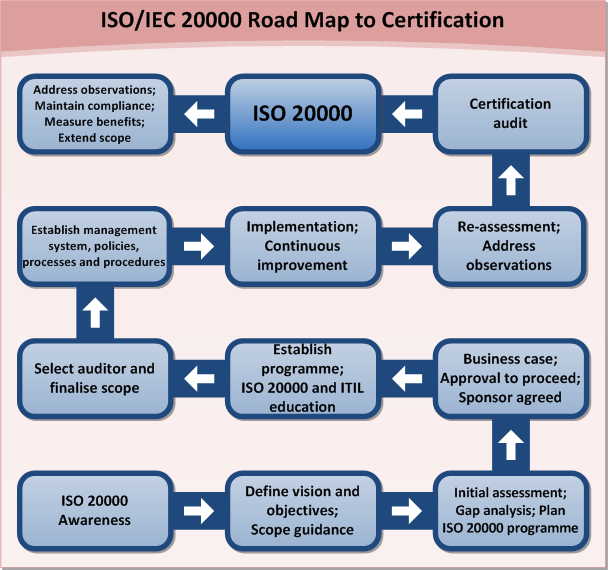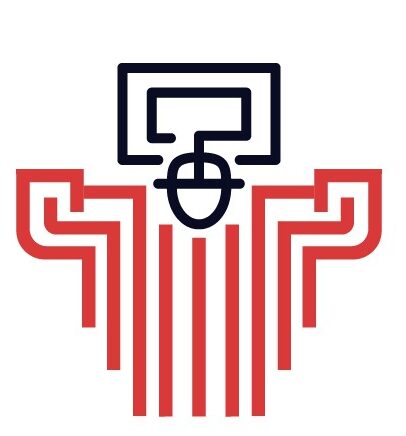ISO 20000 Latest
What does ISO 20000 stand for?
ISO 20000 is the international standard that describes best practice for IT service management (ITSM). It helps organisations evaluate how effectively they deliver managed services, measure service levels and assess their performance. It is strongly linked to ITIL, the most common approach for IT service management.
What is the difference between ISO 20000 and ITIL?
ISO 20000 is a standard and code of practice; ITIL is a best practice framework. ISO 20000 awards organizations with certification; ITIL does not. ISO 20000 has requirements for processes and management system; ITIL has guidance.
What is the purpose of ISO 20000?
ISO/IEC 20000 is the international ITSM (IT service management) standard. It enables IT departments to ensure that their ITSM processes are aligned with the business’s needs and international best practices.
Benefits of ISO 20000
ISO 20000 can assist your organisation in benchmarking its IT service management, improving its services, demonstrating an ability to meet customer requirements and creating a framework for an independent assessment.
Some of the most common benefits of ISO 20000 certification for service providers are that it:
1-Offers competitive differentiation by demonstrating reliability and high quality of service;
2-Gives access to key markets, as many organisations in the public sector mandate that their IT service providers demonstrate compliance with ISO/IEC 20000;
3-Provides assurance to clients that their service requirements will be fulfilled;
4-Enforces a measurable level of effectiveness and a culture of continual improvement by enabling service providers to monitor, 5-5-Measure and review their service management processes and services;
6-Drives down the costs of conformance to a multitude of regulations, including the PCI DSS and Sarbanes-Oxley;
7-Helps leverage ITIL practices to optimise resources and processes.
What does ISO 20000 actually look like?
Context of the organization.
Leadership.
Planning.
Support of the service management system.
Operation of the service management system.
Performance evaluation.
Improvement.

ISO 20000 Parts 1, 2, 3, 4 and 5
ISO 20000 has two main parts under the general title Information technology – Service management. They enable IT service providers to identify how to enhance the quality of service they deliver to their customers, both internally and externally.
Part 1: Specification (ISO/IEC 20000-1:2011) provides requirements for IT service management and is relevant to those responsible for initiating, implementing or maintaining IT service management in their organisation. It provides an SMS specification.
Part 2: Code of practice (ISO/IEC 20000-2:2012) describes the best practices for service management processes within the scope of ISO/IEC 20000-1.
ISO20000 uses a process-based approach for continual improvement. Organisations can have their IT service management systems independently certified as conforming to the requirements of ISO/IEC 20000-1:2011.
The two mains parts of ISO 20000 are not clear on scoping. They say, simply, that ‘the requirements for a service provider to deliver managed services of an acceptable quality for its customers.’
This is where ISO/IEC 20000-3:2012 comes in. ISO 20000-3 provides vital information on writing a scope for a service management system (SMS), as well as providing information on implementing an ISO/IEC 20000-1 SMS. ISO 20000-4 will help you develop a process assessment model according to ISO/IEC 15504 process assessment principles.
The final part of the ISO 20000 standard, ISO20000-5, provides an implementation plan for an SMS that meets the requirements of ISO/IEC 20000-1.
ISO/IEC 20000 is the international standard for IT service management. It was developed in 2005 by ISO/IEC JTC1/SC7 and revised in 2011 and 2018.It was originally based on the earlier BS 15000 that was developed by BSI Group.
ISO/IEC 20000, like its BS 15000 predecessor, was originally developed to reflect best practice guidance contained within the ITIL framework,[citation needed] although it equally supports other IT service management frameworks and approaches including Microsoft Operations Framework and components of ISACA’s COBIT framework. The differentiation between ISO/IEC 20000 and BS 15000 has been addressed by Jenny Dugmore.
The standard was first published in December 2005. In June 2011, the ISO/IEC 20000-1:2005 was updated to ISO/IEC 20000-1:2011. In February 2012, ISO/IEC 20000-2:2005 was updated to ISO/IEC 20000-2:2012.
ISO 20000-1 has been revised by ISO/IEC JTC 1/SC 40 IT Service Management and IT Governance. The revision was released in July 2018. From that point certified entities enter a three year transition period to update to the new version of ISO 20000-1.ISO/IEC 20000-1:2018 – Information technology — Service management — Part 1: Service management system requirements
ISO/IEC 20000-1: Service management
Formally: ISO/IEC 20000-1:2018 (‘part 1’) specifies requirements for “establishing, implementing, maintaining and continually improving a service management system (SMS). An SMS supports the management of the service lifecycle, including the planning, design, transition, delivery and improvement of services, which meet agreed requirements and deliver value for customers, users and the organization delivering the services.”. The 2018 version (ISO/IEC 20000-1:2018) comprises ten sections, following the high-level structure from Annex SL of the Consolidated ISO/IEC Directives, Part 1:
Scope
Normative references
Terms and definitions
Context of the organization
Leadership
Planning
Support of the Service Management System
Operation of the Service Management System
Performance Evaluation
Improvement
ISO/IEC 20000-2: Guidance on the application of service management systems
ISO/IEC 20000-2:2019 provides guidance on the application of service management systems (SMS) based on the requirements in ISO/IEC 20000-1:2018.
ISO/IEC 20000-3: Guidance on scope definition and applicability of ISO/IEC 20000-1
ISO/IEC 20000-3:2019 provides guidance on scope definition, applicability and demonstration of conformance for service providers aiming to meet the requirements of ISO/IEC 20000-1, or for service providers who are planning service improvements and intending to use ISO/IEC 20000 as a business goal. It supplements the advice in ISO/IEC 20000-2, which provides generic guidelines for implementing an SMS in accordance with ISO/IEC 20000-1.
[Withdrawn] ISO/IEC 20000-4: Process assessment model
ISO/IEC TR 20000-4:2010 has been withdrawn. A set of new documents providing a Process Reference Model (PRM) and a Process Assessment Model (PAM) based on ISO/IEC 20000-1:2018 is being developed by ISO/IEC JTC1/SC7 in the 33000 series of standards.
ISO/IEC 20000-5: Implementation guidance for ISO/IEC 20000-1
ISO/IEC TR 20000-5:2022 provides guidance to service providers on how to implement an SMS based on ISO/IEC 20000-1.
ISO/IEC 20000-6 Requirements for bodies providing audit and certification of service management systems
ISO/IEC 20000-6:2017 provides requirements for auditing bodies for the assessment of conformance to ISO/IEC 20000-1.
[Withdrawn] ISO/IEC 20000-7: Guidance on the Integration and Correlation of ISO/IEC 20000-1:2018 to ISO 9001:2015 and ISO/IEC 27001:2013
ISO/IEC TR 20000-7:2019 provides guidance on the integrated implementation of a Service Management System based on ISO/IEC 20000-1:2018 with a Quality Management System based on ISO 9001:2015 and/or an Information Security Management System based on ISO/IEC 27001:2013.
[Withdrawn] ISO/IEC 20000-9: Guidance on the application of ISO/IEC 20000-1 to cloud services
ISO/IEC TR 20000-9:2015 provided guidance on the use of ISO/IEC 20000‑1:2011 for service providers delivering cloud services.
ISO/IEC 20000-10: Concepts and vocabulary
ISO/IEC TR 20000-10:2018 describes the core concepts of ISO/IEC 20000, identifying how the different parts support ISO/IEC 20000‑1:2018 as well as the relationships between ISO/IEC 20000 and other International Standards and Technical Reports. This part of ISO/IEC 20000 also explains the terminology used in the ISO/IEC 20000 series, so that organizations and individuals can interpret the concepts correctly.
ISO/IEC 20000-11: Guidance on the relationship between ISO/IEC 20000-1 and service management frameworks:
ITIL
ISO/IEC TS 20000-11:2021 is a Technical Specification that provides guidance on the relationship between ISO/IEC 20000-1:2011 and a commonly used service management framework, ITIL 4.
Read More About SaaS
Buy From Amazon
